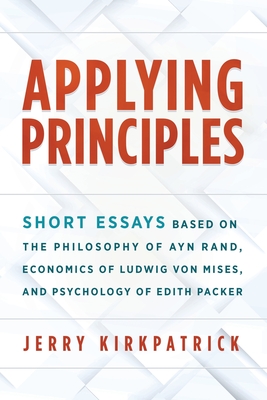Applying Principles: Short Essays Based on the Philosophy of Ayn Rand, Economics of Ludwig von Mises, and Psychology of Edith Packer

Applying Principles: Short Essays Based on the Philosophy of Ayn Rand, Economics of Ludwig von Mises, and Psychology of Edith Packer
Applying Principles is a collection of short essays published between January 2007 and December 2016 as monthly blogposts at jerrykirkpatrick.blogspot.com. The author's aim was to write interdisciplinary, serious posts to inspire critical thinking. Topics, grouped as chapters, range from capitalism and politics to epistemology, academia, education, psychology, youth sports, and the arts.
The title derives from the author's thirty-six years as educator in the applied science of business marketing. Applied sciences, the author realized early in his career, require a deductive process of applying general, more fundamental principles to specific issues. The business disciplines rest on economics and psychology, and those two in turn, as all sciences, rest on philosophy.
The essays therefore are not journalistic, though many deal with recent issues; they apply fundamental ideas to concrete areas. Examples: "Choice Theory and Capitalism versus Dictatorship," "The Ethics and Epistemology of Peer Review," "Interest and the Core Curriculum," "Ensuring that Disposition Trumps Situation," and "Nutrition and the Argument from Uncertainty."
Posts included in "youth sports" came about because the author's daughter played softball; many comments bring up issues in psychology. And "the arts"-only two posts-stem from the author's lifelong interest in music.
Applied science gathers all relevant concrete facts of the specific case it is working on, then uses, that is, applies, the universal concepts and principles of the fundamental sciences on which it rests, plus the narrower concepts and principles of its discipline.
Excerpt from "Describe, Don't Evaluate," pp. 201-02:
This principle-describe, don't evaluate-has broad application and includes relationships not just of sellers to customers, but also of parents to children, teachers to students, and employers to employees, among others. The principle is recommended as a replacement for negative criticism: "The milk spilled!" (describe) as opposed to "I don't believe you did it again! How could you!" (evaluate). Name-calling, sarcasm, threats, berating, and the like, undercut self-esteem and cause defensiveness by attacking the other person's character or personality.
Factually describing the incident helps the other person (child or student or employee) avoid drawing negative conclusions about him- or herself. The recipient of the criticism is then allowed to regroup and correct the situation. "Co
PRP: 96.79 Lei
Acesta este Pretul Recomandat de Producator. Pretul de vanzare al produsului este afisat mai jos.
87.11Lei
87.11Lei
96.79 LeiIndisponibil
Descrierea produsului
Applying Principles is a collection of short essays published between January 2007 and December 2016 as monthly blogposts at jerrykirkpatrick.blogspot.com. The author's aim was to write interdisciplinary, serious posts to inspire critical thinking. Topics, grouped as chapters, range from capitalism and politics to epistemology, academia, education, psychology, youth sports, and the arts.
The title derives from the author's thirty-six years as educator in the applied science of business marketing. Applied sciences, the author realized early in his career, require a deductive process of applying general, more fundamental principles to specific issues. The business disciplines rest on economics and psychology, and those two in turn, as all sciences, rest on philosophy.
The essays therefore are not journalistic, though many deal with recent issues; they apply fundamental ideas to concrete areas. Examples: "Choice Theory and Capitalism versus Dictatorship," "The Ethics and Epistemology of Peer Review," "Interest and the Core Curriculum," "Ensuring that Disposition Trumps Situation," and "Nutrition and the Argument from Uncertainty."
Posts included in "youth sports" came about because the author's daughter played softball; many comments bring up issues in psychology. And "the arts"-only two posts-stem from the author's lifelong interest in music.
Applied science gathers all relevant concrete facts of the specific case it is working on, then uses, that is, applies, the universal concepts and principles of the fundamental sciences on which it rests, plus the narrower concepts and principles of its discipline.
Excerpt from "Describe, Don't Evaluate," pp. 201-02:
This principle-describe, don't evaluate-has broad application and includes relationships not just of sellers to customers, but also of parents to children, teachers to students, and employers to employees, among others. The principle is recommended as a replacement for negative criticism: "The milk spilled!" (describe) as opposed to "I don't believe you did it again! How could you!" (evaluate). Name-calling, sarcasm, threats, berating, and the like, undercut self-esteem and cause defensiveness by attacking the other person's character or personality.
Factually describing the incident helps the other person (child or student or employee) avoid drawing negative conclusions about him- or herself. The recipient of the criticism is then allowed to regroup and correct the situation. "Co
Detaliile produsului








